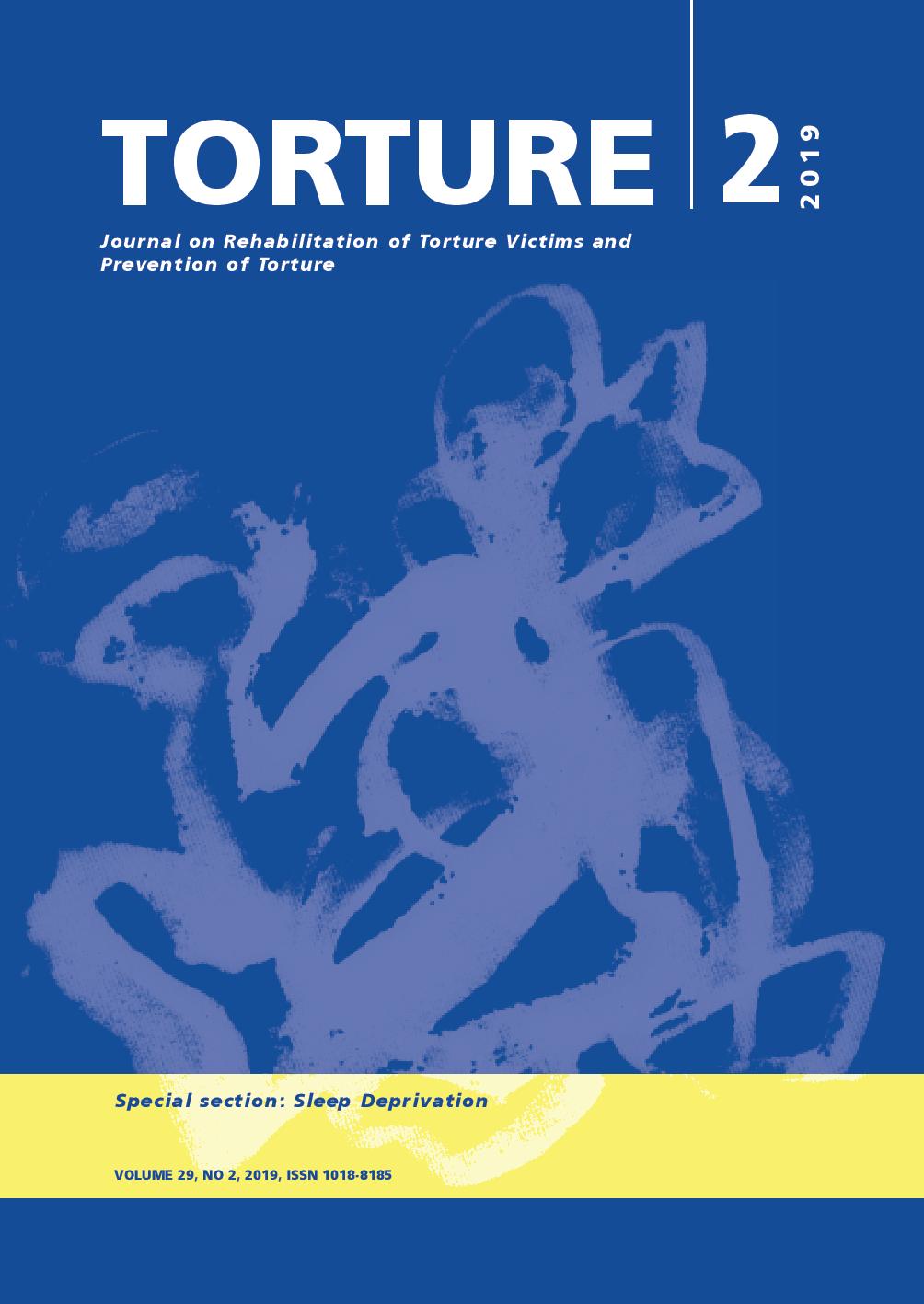Protocol on Medico-Legal Documentation of Sleep Deprivation
DOI:
https://doi.org/10.7146/torture.v29i2.116320Keywords:
Psychological Torture, Accountability, Medico-legal documentation, Interdisciplinary cooperation between lawyers and health professionals, sleep deprivationAbstract
This Protocol originates from a joint project regarding documentation of psychological torture initiated by the Public Committee against Torture in Israel (PCATI), REDRESS and DIGNITY - Danish Institute Against Torture (DIGNITY) in 2015 after the Copenhagen Conference on Psychological Torture. The project is a vehicle to establish a common understanding between health and legal professions as to how to best ensure the most accurate documentation of torture.
Historically, sleep deprivation has been used for different objectives but, primarily, to cause stress and duress for the purpose of extracting information and confessions. Detention centers with poor conditions is another context in which sleep deprivation, as a consequence of sleep disruption, takes place. This is often due to overcrowding, insufficient or no mattresses, and poor conditions of transportation between the courts and detention facilities. The aim of the Protocol is to improve documentation of sleep deprivation used in such settings (most often during interrogation) and therefore to clarify the facts of the case so that stronger legal claims can subsequently be submitted to local and international complaints mechanisms. The Protocol has been developed based on a methodology involving: compilation and review of legal and health knowledge on sleep deprivation, also in non-torture contexts; drafting by first author; discussion in the group of international experts; pilot- testing by PCATI; and evaluation by the three organizations and the group of experts. Despite generic elements of sleep deprivation, the context in a specific country will determine many aspects of the factual situation. Each context differs and as such this Protocol could serve as a guideline or a checklist of elements to be considered in a specific context. We hope that this Protocol will assist in the discussions between the various stakeholders and provide guidance on what can be documented and how to document sleep deprivation.
References
Beattie, L., Kyle, S. D., Espie, C. A., & Biello, S. M. (2015). Social interactions, emotion and sleep: A systematic review and research agenda. Sleep Medicine Reviews, 24, 83–100. https://doi.org/10.1016/j.smrv.2014.12.005
Cakal. E. (2019). Befogging Reason, Undermining Will: Understanding Sleep Deprivation as Torture and Other Ill- Treatment in International Law. Torture Journal 29(2), 11-22 doi: 10.7146/torture.v29i2.109620
Hirshkowitz, M., Whiton, K., Albert, S. M., Alessi, C., Bruni, O., Don Carlos, L., …Adams Hillard, P. J. (2015). National Sleep Foundation’s sleep time duration recommendations: methodology and results summary. Sleep Health, 1(1), 40–43. https://doi.org/10.1016/j.sleh.2014.12.010
Gudjonsson, G. H. (2003). The psychology of interrogations and confessions. A handbook. London: Wiley.
Hawker, G. A., Mian, S., Kendzerska, T., & French, M. (2011). Measures of adult pain: Visual Analog Scale for Pain (VAS Pain), Numeric Rating Scale for Pain (NRS Pain), McGill Pain Questionnaire (MPQ), Short-Form McGill Pain Questionnaire (SF-MPQ), Chronic Pain Grade Scale (CPGS), Short Form-36 Bodily Pain Scale (SF. Arthritis Care and Research, 63(SUPPL. 11), 240–252. https://doi.org/10.1002/acr.20543
Jackson, S. A., Martin, G. D., Aidman, E., & Kleitman, S. (2017). Acute short-term sleep deprivation does not affect metacognitive monitoring captured by confidence ratings: a systematic literature review. Metacognition and Learning. https://doi.org/10.1007/s11409-017-9177-y
Leo, R. A. (1996). Inside the interrogation room. The Journal of Criminal Law & Criminology, 86(2), 266–303.
Lim, J., & Dinges, D. F. (2010). A meta-analysis of the impact of short-term sleep deprivation on cognitive variables. Psychological Bulletin, 136(3), 375–389. https://doi.org/10.1037/a0018883
Lowe, C. J., Safati, A., & Hall, P. A. (2017). The neurocognitive consequences of sleep restriction: A meta-analytic review. Neuroscience and Biobehavioral Reviews, 80, 586–604. https://doi.org/10.1016/j.neubiorev.2017.07.010
Perez-Sales, P. (2017). Psychological Torture: Definition, Evaluation and Measurement. Routledge Books. London.
Philibert, I. (2005). Sleep loss and performance in residents and nonphysicians: a meta-analytic examination. Sleep, 28(11), 1392–1402.
Pires, G. N., Bezerra, A. G., Tufik, S., & Andersen, M. L. (2016). Effects of acute sleep deprivation on state anxiety levels: a systematic review and meta-analysis. Sleep Medicine, 24, 109–118. https://doi.org/10.1016/j.sleep.2016.07.019
Reynolds, A. C., & Banks, S. (2010). Total sleep deprivation, chronic sleep restriction and sleep disruption. Progress in Brain Research (Vol. 185). Elsevier B.V. https://doi.org/10.1016/B978-0-444-53702-7.00006-3
Schrimpf, M., Liegl, G., Boeckle, M., Leitner, A., Geisler, P., & Pieh, C. (2015). The effect of sleep deprivation on pain perception in healthy subjects: a meta-analysis. Sleep Medicine, 16(11), 1313–1320. https://doi.org/10.1016/j.sleep.2015.07.022
Watson, N. F., Badr, M. S., Belenk, G., & Bliwise, D. L. (2015). Recommended amount of sleep for a healthy adult. American Academy of Sleep Medicine and Sleep Research Society, 38(6), 843–844. https://doi.org/10.5665/sleep.4716
Waters, F., Chiu, V., Atkinson, A., & Blom, J. D. (2018). Severe Sleep Deprivation Causes Hallucinations and a Gradual Progression Toward Psychosis With Increasing Time Awake. Frontiers in Psychiatry, 9, 303. https://doi.org/10.3389/fpsyt.2018.00303
United States Army. (2006). Appendix M of the Army Field Manual Human Intelligence Collector Operations, FM 2-22.3 of September 2006.
Court judgments:
ECHR. (2004). Bati v. Turkey, 33097/96 and 57834/00.
ECHR. (2007). Bagel v. Russia, 37810/03.
ECHR. (2011). Mader v. Croatia, 56185/07.
ECHR. (2012). Strelets v. Russia, 28018/05.
ECHR. (2016). Sadretdinov v. Russia, 17564/06.
ICTY. (2002). Prosecutor v. Krnojelac. Case No. IT-97-25 (Trial Chamber) 15 March 2002.
ICTY. (2006). Naletilic and Matinovic. Appeal Judgement, 3 May 2006.
Inter-American Commission on Human Rights. (2003). Maritza Urrutia v. Guatemala. 27 November 2003. Series C No. 103.
Concluding Observations by the UN Committee Against Torture
UN Committee Against Torture (2006). Conclusions on USA. CAT/C/USA/CO/2.
UN Committee Against Torture (2014). Conclusions on USA. CAT/C/USA/CO/3-5.
UN Committee Against Torture (1998). Conclusion on Israel. CAT/C/ISR/CO/5.
Downloads
Published
How to Cite
Issue
Section
License
We accept that some authors (e.g. government employees in some countries) are unable to transfer copyright. The Creative Commons Licence Attribution-NonCommercial-NoDerivatives 4.0 International (CC BY-NC-ND 4.0) covers both the Torture Journal and the IRCT web site. The publisher will not put any limitation on the personal freedom of the author to use material contained in the paper in other works which may be published, provided that acknowledgement is made to the original place of publication.


